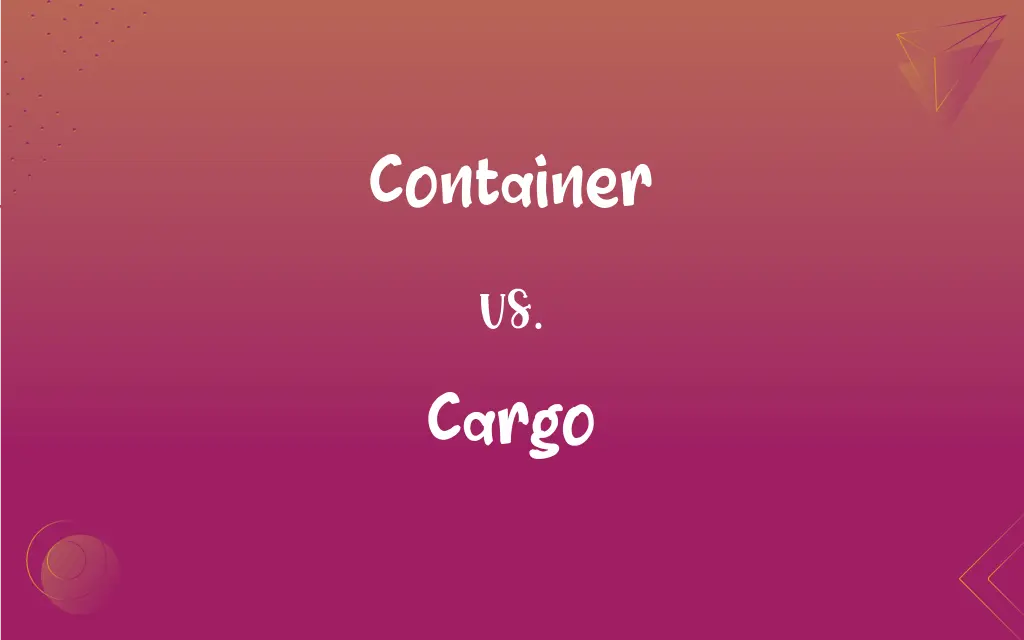Container vs. Cargo: What's the Difference?
Edited by Aimie Carlson || By Janet White || Updated on November 13, 2023
A container is a large, standardized storage box used for transporting goods, while cargo refers to the goods themselves being transported.

Key Differences
Container is a standardized, reusable box used for the transport and storage of goods. Cargo refers to the actual goods or merchandise carried by a vehicle, whether in containers or not.
Containers are designed to be easily loaded, unloaded, and stacked on ships, trains, and trucks, providing an efficient way to handle multiple goods. Cargo, on the other hand, encompasses a wide range of items transported, including raw materials, manufactured products, and other goods.
Containerization revolutionized shipping by allowing a diverse range of cargo to be transported efficiently, reducing loading times and shipping costs. Cargo, however, varies widely in nature and value, from perishable food items to electronics and automobiles.
Containers are physical objects, standardized in size and form (like 20-foot or 40-foot boxes), used in logistics and transportation. Cargo is the content within these containers or any load carried by transport vehicles, including bulk, liquid, or loose items.
In logistics, containers facilitate the organized and secure transport of cargo, protecting it from damage and theft. Cargo is the essential element of trade and commerce, representing the actual goods being traded, shipped, or transported.
ADVERTISEMENT
Comparison Chart
Definition
A large, standardized box for transporting goods.
The goods themselves that are being transported.
Function
To store and transport cargo safely and efficiently.
To be transported and delivered for use, sale, or processing.
Variability
Standardized in size and shape.
Diverse, including a wide range of goods and materials.
Role in Logistics
A tool for facilitating the transportation of cargo.
The primary focus of transportation and shipping activities.
Dependence
Containers depend on cargo to be useful.
Cargo can be transported with or without containers.
ADVERTISEMENT
Container and Cargo Definitions
Container
Standardized equipment in shipping and logistics.
Intermodal containers can be transferred between trucks, trains, and ships.
Cargo
Freight transported for commercial gain.
Air cargo is essential for fast delivery of perishable goods.
Container
A secure and durable box for goods transport.
The container protected the fragile goods during transit.
Cargo
Items or products moved via transportation networks.
The cargo ship was carrying containers filled with various goods.
Container
A large metal box used for transporting goods.
The container was loaded onto the ship, ready for overseas transport.
Cargo
Merchandise carried by a large vehicle for trade.
The train was loaded with cargo bound for the interior regions.
Container
A reusable vessel for holding and transporting merchandise.
The warehouse stored containers before they were shipped out.
Cargo
Goods transported by ship, plane, train, or truck.
The cargo of electronics was shipped from Asia to Europe.
Container
An integral part of modern freight transport systems.
Containerization has streamlined global trade and shipping.
Cargo
The load of goods in a transportation vehicle.
The truck's cargo was carefully secured for the long journey.
Container
A receptacle, such as a carton, can, or jar, in which material is held or carried.
Cargo
Freight carried by a ship, an aircraft, or another vehicle.
Container
A large reusable receptacle that can accommodate smaller cartons or cases in a single shipment, designed for efficient handling of cargo.
Cargo
Freight carried by a ship, aircraft, or motor vehicle.
Container
Someone who contains; something that contains.
Cargo
(Papua New Guinea) Western material goods.
Container
An item in which objects, materials or data can be stored or transported.
Cargo
The lading or freight of a ship or other vessel; the goods, merchandise, or whatever is conveyed in a vessel or boat; load; freight.
Cargoes of food or clothing.
Container
(transportation) A very large, typically metal, box used for transporting goods.
Cargo
Goods carried by a large vehicle
Container
(by extension) Someone who holds people in their seats or in a (reasonably) calm state.
Container
(computing) A file format that can hold various types of data.
Container
(object-oriented programming) An abstract data type whose instances are collections of other objects.
Container
Any user interface component that can hold further (child) components.
Container
(computing) A bundle consisting of operating system, application code and dependencies to be run sandboxed inside a virtualized environment; (by extension) the environment itself.
Container
One who, or that which, contains; particularly, an artifactual object that is designed to contain some fluid or solid material, object or objects, especially for convenience in transporting the contained objects.
Container
A large metallic box designed to hold many smaller boxes or packages, and used for convenience in loading and unloading large quantities of freight, such as on ships, trains, or airplanes.
Container
Any object that can be used to hold things (especially a large metal boxlike object of standardized dimensions that can be loaded from one form of transport to another)
FAQs
Are containers only used for sea transport?
No, they're used in sea, rail, and road transport.
Can cargo be anything?
Yes, cargo can be any goods transported for commercial purposes.
What types of cargo are there?
Bulk, break bulk, liquid, containerized, and dry cargo.
What is a shipping container?
A standardized metal box used for transporting goods.
What does cargo mean in shipping?
The goods or merchandise being transported.
How large is a typical container?
Common sizes are 20 feet and 40 feet in length.
Do containers protect cargo?
Yes, they offer protection from weather, damage, and theft.
How is cargo weight measured?
In metric tons or by volume in cubic meters.
Is cargo transportation regulated?
Yes, by international and national transportation laws.
Can containers be used for storage?
Yes, they're often used for temporary or long-term storage.
How is cargo secured during transport?
Through strapping, blocking, and bracing inside containers or vehicles.
How are containers loaded onto ships?
Using cranes, they are stacked and secured on cargo ships.
What is the most common cargo?
Common cargoes include consumer goods, electronics, and food products.
Can containers be customized?
Yes, for specific needs like refrigeration or oversized cargo.
What is hazardous cargo?
Goods that are dangerous and require special handling, like chemicals.
Are containers tracked during transport?
Yes, using GPS and other tracking systems.
Are all containers the same size?
No, they come in various standardized sizes.
Do containers float?
Generally no, but they are watertight and can float briefly.
How is cargo value determined?
By its market value, weight, and transportation cost.
Can individuals ship personal cargo?
Yes, through freight forwarders or personal shipping services.
About Author
Written by
Janet WhiteJanet White has been an esteemed writer and blogger for Difference Wiki. Holding a Master's degree in Science and Medical Journalism from the prestigious Boston University, she has consistently demonstrated her expertise and passion for her field. When she's not immersed in her work, Janet relishes her time exercising, delving into a good book, and cherishing moments with friends and family.
Edited by
Aimie CarlsonAimie Carlson, holding a master's degree in English literature, is a fervent English language enthusiast. She lends her writing talents to Difference Wiki, a prominent website that specializes in comparisons, offering readers insightful analyses that both captivate and inform.
































































